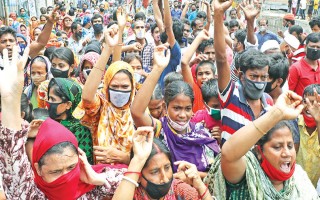Slum people in a fix as NGOs suspend health services
Non-government organisations engaged in providing the slum-dwelling urban poor with different services, including health services, have suspended their activities during the coronavirus outbreak.
Slum people said that sudden halt of the services increased their health risks and sufferings in the time of the epidemic that killed 20 and infected 218 people in Bangladesh.
Public health experts said that the situation was challenging to provide regular health services in the densely populated areas. They advised the NGOs to continue to maintain minimum services while ensuring safety of their employees.
The services the urban poor regularly received from non-government organisations included distribution of family planning materials, services such as regular check-up for pregnant mothers, delivery facilities, child care, vaccination, adolescent health and other regular health free of cost or at subsidised costs.
World’s largest NGO BRAC, which claims to cover five million slum dwellers in Dhaka, regularly provides health services at the door of the beneficiaries was now planning to start services in a limited scale as it suspended its services due to the coronavirus situation.
BRAC’s health programme associate director Morsheda Chowdhury told New Age that their health service providers used to go to the houses of pregnant mothers to check their physical condition, including blood pressure, diabetic level, and fundal height on regular basis, that was suspended due to COVID-19.
‘We are collecting phone numbers to ensure their health services over phone,’ she said.
Brac has 20 maternity centres and six health care facilities in Dhaka where poor slum people used to get health care facilities free of charge or at a subsidised rate.
Sajida Foundation’s senior director Fazlul Hoque told New Age that the organisation worked on water, sanitation as well as physical and mental health related issues. Due to COVID-19 situation, the organisation was forced to stop all types of services, including health as they sent their workers on leave as per the government decision.
‘As it is not a normal situation, our regular activities are not running regularly,’ he said.
The organisation runs five shelter houses for street children across the city where several hundred street children, mostly orphans, are given day care facilities.
Dushtha Shasthya Kendra executive director Dibalok Singha said that their employees were giving health tips over phone as their office remained close.
Officials of a number of organisations working in slums for destitute people said that providing services in slums was much difficult in this time because of the population density.
They feel that more hand washing facilities in slum should be created, the slum dwellers should be inspired to follow all kinds of hygienic practices and maintain social distancing.
Bangabandhu Sheikh Mujib Medical University public health associate professor Romen Raihan said that considering the reality, the NGOs could enhance telemedicine service until they could reach the people in person.
Marjina Khatun, a resident of Dhaka’s Karail slum, said that she used to get maternity health care from an NGO but in the last 10 days, none of the health workers went to visit anyone in the slum.
Marjina was forced to take treatment form a private hospital spending a large amount on ultrasonography which she used to get in at a lower cost from the NGO.
Quoting doctors, she said that the foetus was in a troubled position in her womb but she had no health worker to seek advice from.
Two city corporations in Dhaka suspended ‘Measles-Rubella Campaign 2020’ which was scheduled to begin on 18 March to tackle the spread of coronavirus.
City corporation officials said that due to coronavirus their door-to-door primary healthcare services were suspended but hospital facilities, specially for pregnant mothers continued.
An official of Nari Maitree, one of the NGOs working with the city corporations to enhance their health services, said that now they were giving hospital services but field services stopped like all other NGOs.
Dhaka North City Corporation’s chief social welfare and slum development officer Tazina Sarwar said that around 70 NGOs work in the DNCC area and 18/20 of those were working to provide health services for the urban poor.
Dhaka South City Corporation chief health officer Brigadier General Md Sharif Ahmed said that the DSCC works with five partner NGOs to implement Asian Development Bank-funded Urban Primary Healthcare Services Delivery Project and services of the project also reduced for the coronavirus situation.
News Courtesy: www.newagebd.net











